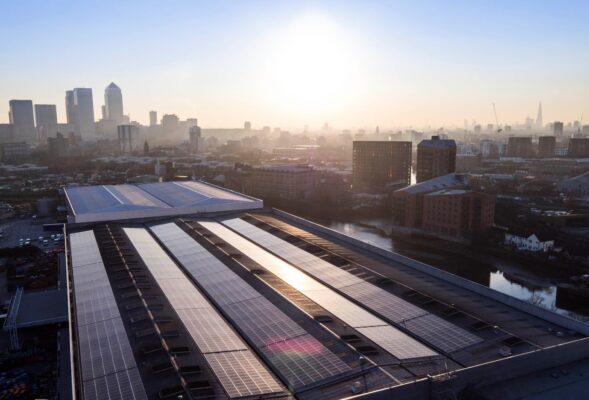Contact us today for your Free Quote
69% of employed adults said they want their companies to invest in sustainability, how can businesses leverage this in 2025?
Nowadays, in the business world, sustainability often dictates environmental targets for a company, influencing corporate decisions and risk-taking. Some people may see this as having a trade-off relationship at the expense of a business’s capabilities. However, it doesn’t always have to be seen like that, some studies suggest strong potential for grasping both opportunities simultaneously.
According to a 2023 piece by Deloitte, 69% of employed adults said they want their companies to invest in sustainability efforts. But that’s not all, another Deloitte survey in the same piece further suggests that 27% of job applicants consider a company’s sustainable track record before selecting an employer. This sentiment is further reflected by another survey by IBM, suggesting that 67% of respondents are more willing to apply to environmentally sustainable companies, showing their appeal. These figures highlight its popularity, as well as the branding appeal it could have for businesses, hinting at a case for its role in recruitment.
But that’s not all, aside from its popularity, data shows enough evidence to build a potential case for a sustainability strategy benefitting profits as well. According to edie, a significant minority of 31% of organisations have already seen a substantially positive impact on revenue and profits by elevating their sustainability credentials. Moreover, 57% anticipate seeing a return on investment from at least one green project within the next five years, hinting at cost benefits if executed successfully. This further builds the case for aligning business and environmental goals in certain cases.
So far, we’ve identified ways in which sustainability pledges can potentially benefit many business aspects, including recruiting new talent, as well as optimising costs and profits.
We’ve listed the benefits, so why not set a sustainable New Year’s Resolution for your business? To help you achieve this, we’ve created some sustainability-related resolutions to help your business reach the next level in 2025.
Using Scope Emissions to Find Sustainable New Year’s Resolutions
Before we begin, it is important to explain what scope emissions are to categorise the pledges we have put together. This is also a useful framework to inspire ideas for other sustainability-related pledges.
To understand the full impact of a business’s environmental footprint, it is important to understand scope emissions. Scope 1, 2 and 3 emissions are all part of a company’s carbon footprint:
- Scope 1: Direct emissions from sources that a company owns or controls, such as fuel combustion in company vehicles.
- Scope 2: Indirect emissions from the energy a company purchases, such as electricity used in its offices.
- Scope 3: Indirect emissions from the company’s value chain, such as emissions from suppliers and transportation.
At face value, your business may have an eco-friendly footprint, but external aspects such as energy usage and value chain choices are linked to your overall track record, meaning that they need to be addressed for a sound and sustainable strategy. This concept will help to validate the pledges listed in this piece for you.
Reduce Your Company’s Energy Consumption
As the world becomes increasingly aware of the need to reduce greenhouse gas emissions, more and more businesses are looking for ways to cut their energy consumption.
One simple way to do this is to pledge to reduce your company’s energy consumption by a certain percentage each year. This is a straightforward example for mostly reducing scope 2 emissions, which come indirectly from energy use. By cutting externally-sourced energy from traditional sources, or opting for sustainable energy options, you can significantly reduce scope 2 emissions.
This not only helps to protect the environment, but it can also save your business money on energy costs. To help advance this, we listed a few simple ways in doing so.
Reducing Your Footprint (& Costs) with LED Lights
The Energy Saving Trust suggests that the average UK household’s lighting accounts for around 15% of their traditional electricity bill, making it a great source of reducing emissions and costs.
Switching to LED lights is a simple and effective way to reduce your carbon footprint, lasting upwards of 10,000 hours. This means that you’ll save money on your energy bills and reduce your carbon emissions.
Monitoring Heating with Smart Thermostats
Another major source of energy use (and costs) is heating, with some sources suggesting that around half of the UK’s gas is used for heating. Lowering the heat within an office in itself would also fall under scope 1 emissions, as they are directly under a company’s control.
Smart thermostats can help you save energy by automatically adjusting your heating based on your schedule and the temperature outside, monitoring your energy use. Some sources suggest that smart thermostats can save 22% in heating bills, showcasing strong potential in being incorporated into an effective sustainability strategy.
Making the switch to a smart thermostat is a small change that can make a big difference to your energy bills and your carbon footprint.
Invest in Renewable Energy (Solar Panels)
Investing in renewable energy, like solar panels, is a great way to build up sustainability credentials. It can save you money on your energy bills and help the environment, with UK sources suggesting that the average time for them to pay back is estimated at around 6 to 12 years. Moreover, they require low maintenance, with cleaning being recommended every 6 months.

Encourage Employees to Carpool or Use Public Transport
Many employers are interested in finding ways to reduce traffic congestion and improve air quality, which is a frequently discussed topic in major urban centres. To highlight this, a 2021 study by Imperial College London suggested that the city’s air quality could be contributing to the premature deaths of 4,000 people.
One way to reduce air pollution is to encourage employees to carpool or use public transportation when commuting. Carpooling is a transportation option that is used by employees to commute to and from work. It is not directly related to the company’s supply chain or the use of its products or services. Therefore, it falls under scope 3 emissions.
In the UK, studies have shown that carpooling can lead to a 20% decrease in pollution from cars. Not only is carpooling good for the environment, but it can also save your employees money and increase team spirit.
Promote Sustainable Living Practices & Educate Your Stakeholders
So far, we’ve mostly outlined suggestions for your facility, however, it is also crucial to educate your stakeholders, to provide them with the knowledge needed to live sustainably, such as by recycling correctly. This would fall mostly under scope 3 emissions, as they are those that occur outside of a company’s direct control.
When looking for sustainable service providers, such as waste management, advanced recyclers such as Bywaters have dedicated Sustainability Teams to educate businesses on sustainable practices, such as recycling etiquette and carbon footprints. Moreover, we also have a comprehensive Bywaters Waste Management Course that is available to the public to conveniently educate themselves on correct recycling practices.
Finally, you can educate your staff and customers about the importance of sustainability and how everyone can do their part to protect the environment. By taking these steps, you can help to create a more sustainable world for future generations.
Working with Bywaters to Reduce Your Scope 3 Waste Management Emissions
With the resolutions discussed, as well as their scope emissions’ significance, a business would also significantly benefit their own scope 3 emissions by finding environmentally responsible value chain partners. That being said, why not consider Bywaters as your sustainable waste management partner?
Being on track to achieve net zero by 2030, Bywaters is one of the best organisations available to access a recycling service that reduces your scope 3 emissions. Some ways we help businesses cut emissions are through:
- A Fleet of Sustainable Vehicles: All our collections are low-emissions, hybrid or fully electric. This helps reduce your waste collection emissions.
- Zero Waste Direct to Landfill: We reuse, recycle and recover everything that we collect.
- Bespoke Reporting: We have a dedicated reporting tool, which helps to break down your waste management emissions and how to reduce them.

To find out more about Bywaters’ emissions reduction efforts, checkout out their net zero whitepaper, detailing all of the energy-saving methods taken to reach the target. Moreover, we will be releasing an updated edition of this document in 2025, highlighting what we have done to stay on track.
You’ve Made it This Far…
Sustainability is more than just a trend; it’s a smart business decision. As we’ve shown at the start, research suggests it can help you attract top talent, win new business and improve operations.
To get this started, we showcased some ideas for your business to kick off 2025 with a solid sustainability pledge. To help develop pledges, we presented the scope emissions framework, a tool used to categorise emissions for practices such as reporting. Through this piece, the framework has been useful to identify our own valid areas to look into for drafting sustainability pledges, as well as to help inspire ideas for independently created solutions.
We’re here to help you reduce your environmental impact and save money on your waste management costs. Contact us today, to make 2025 the New Year your company deserves.
More posts:
Valentine’s Day: History, Tradition, and Its Modern Impact
This post traces the evolution of Valentine’s Day from ancient Roman rituals to a global commercial event. It highlights the holiday’s hidden environmental impact and offers a guide to celebrating sustainably through “Circular Romance” and waste reduction.
Read morePlastic Recycling: Why Are Some Types Harder to Process Than Others?
Some plastics recycle easily, while others are difficult or impractical to process at scale. This article explains why material type, packaging design, contamination and recycling infrastructure all play a role, and what businesses can do to improve plastic recycling outcomes in the UK.
Read moreThe Ultimate Guide For a Sustainable School and University
Download The Ultimate Guide For a Sustainable School or University. Get the roadmap to cut costs, reduce your carbon footprint, and boost your ESG profile with 5 core pillars.
Read more




